Studies in the Dead Sea Scrolls (12 vols.)
Digital Logos Edition
Overview
With the Studies in the Dead Sea Scrolls collection, the world of the Dead Sea Scrolls is at your fingertips. The twelve volumes examine a variety of issues surrounding the Scrolls, offering examinations of the texts themselves together with perspectives on their historical and contemporary significance. The collection also features Geza Vermes’ highly regarded translation of the Dead Seas Scrolls in English, rounding out a terrific collection for both students and scholars of these fascinating artifacts.
Included in the Studies in the Dead Sea Scrolls collection is the complete Companion to the Qumran Scrolls series. Each of the six volumes is dedicated to a different type of text, and taken together cover the purity texts, war texts, exegetical texts, temple scrolls, Pesharim, and Damascus texts. The contributors to the Companion to the Qumran Scrolls series take account of a wide range of relevant and recently published texts and provide extensive bibliographies. And each title in the series is authoritatively written in accessible language.
Few archeological discoveries of the past hundred years have been as important, or as captivating, as the Dead Sea Scrolls. They are the oldest Hebrew manuscripts of biblical texts known to man, predating the second-oldest manuscript by over a thousand years. Written in Hebrew, Aramaic and Greek, the scrolls contain every book of the Hebrew bible except Esther and Nehemiah, and are of invaluable significance for biblical textual criticism.

- Title: Studies in the Dead Sea Scrolls
- Volumes: 12
- Pages: 2,463
This title is included in the following collections
You can save when you purchase this product as part of a collection.
2025 Researcher Diamond Librar...
$2,999.99$2,249.992025 Messianic Jewish Diamond
$2,999.99$2,249.992025 Orthodox Diamond
$2,999.99$2,249.992025 아카데믹 다이아몬드 서재
$3,149.99$2,362.49
- $4,749.99$3,562.49
- $4,749.99$3,562.49
- $4,749.99$3,562.49
- $4,899.99$3,674.99
- $4,749.99
- $4,749.99
- $7,749.99
- $23,999.99$17,999.99
- $21,749.99
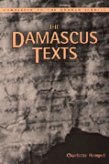
The Damascus document is one of the most important texts from the Qumran caves. Part One of this Companion offers a lucid and up-to-date introduction to all the manuscripts, including the eight from Qumran Cave 4. It also provides a review of the key areas of scholarly research on this important Qumran text. Part Two is devoted to the text 4QMiscellaneous Rules (4Q265; olim Serekh Damascus). This text has already become the subject of intense interest among students of the Dead Sea Scrolls because of its unique relationship to both the Community Rule and the Damascus Document.
Charlotte Hempel is a Fellow of the Meyerhoff Center for Jewish Studies at the University of Maryland.
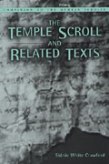
This volume is a comprehensive roadmap to the Temple Scroll, the longest and one of the most complex of the manuscripts from Qumran. The central chapter contains a discussion of the contents of the Temple Scroll, including sections on the Temple and its courts, purity regulation, the festival calendar, and the Deuteronomic Paraphrase with the Law of the King. This volume also includes a chapter on the Description of the New Jerusalem, as well as one on the relationship of the Temple Scroll to the Book of Jubilees, 4QMiqsat Ma'aseh ha-Torah, and the Damascus Document.
Sidnie White Crawford is Professor of Hebrew Bible and Chair, Classics and Religious Studies, University of Nebraska-Lincoln, Lincoln, Nebraska.
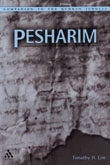
This volume introduces the reader to one of the most important genres of sectarian writing from Qumran: the Pesharim, or biblical commentaries. Timothy Lim systematically discusses the textual characteristics of the quoted bible verses, the literary genre and its relationship with rabbinic midrash, the characteristics of sectarian exegesis, the nature of the historical allusions, and the common features, whether real or imagined, with the New Testament.
Dr. Timothy Lim is Reader in Hebrew and Old Testament Studies, University of Edinburgh.
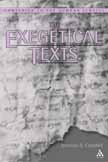
Jonathan G. Campbell provides an introduction to eight sectarian manuscripts from among the Qumran Dead Sea Scrolls that can loosely be called the “Exegetical Texts.” He examines their contents, background, genre, and significance and he provides a history of the relevant research.
The Exegetical Texts constitute a particularly diverse strand of sectarian compositions among the Qumran Dead Sea Scrolls. For this reason, the eight documents are treated in turn in more or less equal measure, with two introductory chapters to set the scene and a conclusion drawing the discussion to a close. Each chapter can be read either alone in its own right or together with the others to gain a broader picture. In order to encourage the reader to encounter the relevant Qumran documents firsthand extensive listings of editions in Hebrew and English are provided.
Jonathan G. Campbell is Senior Lecturer in Biblical Studies and Early Judaism at the University of Bristol.
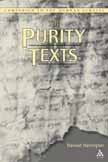
The Purity Texts is a handbook that gathers the data of the Dead Sea Scrolls on ritual purity and analyzes it systematically as part of a coherent ideology. After a general introduction and an examination of individual texts for the contribution of each to the subject of purity, the book devotes a chapter to each of the impurities discussed in the Scrolls: death, leprosy, bodily discharges and outsiders. In each of these chapters, emphasis is placed on the large amount of congruence of the Qumran texts with each other on the subject of purity and the similarities and differences between the Qumran texts and other sources of ancient Judaism.
Dr. Hannah Harrington, a talented exponent of the Milgrom school of fundamental research into biblical ritual, presents a most lucid exposition of the intricacies of Qumran and rabbinic purity laws. In the Second Temple period these laws emerged for a time as a pivotal expression of religious piety.
—Joseph M. Baumgarten, Professor Emeritus, Baltimore Hebrew University
Hannah Harrington is Professor of Old Testament at Patten University in Oakland, CA. She is the author of Impurity Systems of Qumran and the Rabbis and Holiness: Rabbinic Judaism and the Graeco-Roman World.
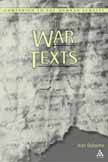
The War Texts is the name given to a small group of Dead Sea Scrolls that depict the preparation for and the various phases of the eschatological battle between the 'Sons of Light' and the 'Sons of Darkness'. Jean Duhaime briefly surveys the history of these texts from their initial discovery to their official publication. He describes the different scrolls and gives details of their contents and their relationships to one another. Duhaime summarizes the various reasons supporting a dating of this composition to the Hellenistic or Roman period and provides an example of the use of the Bible in the War Texts.
Jean Duhaime is Professor of Biblical Interpretation in the Faculté de théologie et de sciences des religions at the Université de Montréal and is the author of 1Les esséniens de Qumrân, des ésotéristes?
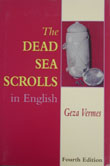
From Religious Studies Review: “This significantly expanded and revised fourth edition of what has always been the best English translation of the Scrolls has become a combination of two books: Vermes has replaced nearly all of the original Introduction with an abridged version of the corresponding material from The Dead Sea Scrolls: Qumran in Perspective... He has also added new translations of material that have been published since the last edition appeared in 1975... By far still the best edition of the scrolls in English.”
Geza Vermes is Professor Emeritus of Jewish Studies, University of Oxford.
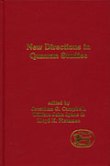
Fifty years after the discovery of the Dead Sea Scrolls there have been many advances in the field of Qumran Studies. Yet much work remains undone. In particular the study of the scrolls has continued to follow long established historical critical methods while largely failing to incorporate recent advances in literary, ideological and sociological approaches.
The essays collected here are the result of the Bristol Colloquium on the Dead Sea Scrolls held in September 2003. Here, ten scholars working in a diversity of areas demonstrate how these recent advances in scholarship increase our knowledge of the scrolls, their historical context, and their impact on modern critical scholarship. The contributors consider a wide range of approaches, ranging across discussions in sociology, anthropology, literary studies, post-colonialism and ideological criticism. These essays will help to take Qumran Studies forward in new and creative ways.
William John Lyons teaches New Testament in the Department of Theology and Religious Studies at the University of Bristol, UK.
Lloyd Keith Pietersen received his Ph.D. from the Department of Biblical Studies, University of Sheffield.
Jonathan G. Campbell is Senior Lecturer in Biblical Studies and Early Judaism at the University of Bristol.
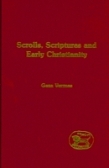
A distinguished scholar and leading authority on the Dead Sea Scrolls, Geza Vermes definitely has a lot of experience and expertise to pass on to his contemporaries and the generations of scholars to come. This collection of essays offers an overview of Dead Sea Scrolls research, ranging from an examination of “The Essenes in History” to a study of “Biblical Proof-Texts in Qumran Literature.”
Without any doubt… Geza Vermes’ works are always a good read and research at its best at the same time. Furthermore, everyone can learn from Vermes’ fine observations and so receive fresh motivation to study the Dead Sea Scrolls in more detail.
—Thomas J. Kraus, Review of Biblical Literature
Geza Vermes is Professor Emeritus of Jewish Studies, University of Oxford.
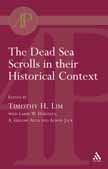
What is the significance of the Dead Sea Scrolls, and what do we know about the community that possessed them? This important work situates the Dead Sea Scrolls in their historical context of Second Temple Judaism and the rise of Early Christianity. Expert scholars address the issue in four sections: The Qumran Community; The Qumran Biblical Text and the Masoretic Text; Sectarian Law and Normative Jewish Law; and The Theology of the Qumran Community, Second Temple Judaism and Early Christianity.
Avoiding both popular sensationalism and specialist technical language, this book aims to integrate all the latest findings about the scrolls into existing knowledge of the period and to advance understanding of many specific issues in Qumran studies in a scholarly and accessible way.
The “state of the art” in international scrolls scholarship, this book includes contributions from E. P. Sanders, J. Ian MacDonald, Eugene C. Ulrich, Julio Trebolle Barrera, George J. Brooke, Lawrence H. Schiffman, Calum Carmichael, James C. VanderKam, Sacha Stern, Charlotte Hempel, John J. Collins, Philip R. Davies, Hakan Ulfgard and James C. Davila.
A first-rate collection of essays by first-rate scholars.
—Professor Shaye J. D. Cohen, Brown University
Dr. Timothy Lim is Reader in Hebrew and Old Testament Studies, University of Edinburgh.
Larry W. Hurtado is Professor of New Testament Language, Literature and Theology, University of Edinburgh.
A. Graeme Auld is Professor of Hebrew Bible, University of Edinburgh.
Alison Jack gained her Ph.D. at New College, Edinburgh and is a minister of the Church of Scotland.
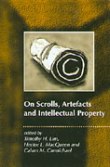
The Dead Sea Scrolls were found in Palestine, recovered in Jordan, and largely edited by an international Christian team who prevented public access to unpublished manuscripts. Subsequently, the state of Israel, which had already purchased many of the Scrolls, has assumed responsibility for all of them. Most recently, one scroll editor has claimed copyright on his reconstruction, instigating a lawsuit and introducing serious implications for future Scrolls scholarship.
This volume looks at international copyright and property rights as they affect archaeologists, editors and curators, but focuses on the issue of “authorship” of the Scrolls, both published and unpublished. The contributors include legal experts as well as many of the major figures in recent controversies, such as Hershel Shanks, John Strugnell, Geza Vermes and Emanuel Tov.
Timothy H. Lim is Reader in Hebrew and Old Testament Studies at the University of Edinburgh.
Hector L. MacQueen is Professor of Private Law and Director, Shepherd and Wedderburn Centre for Research in Intellectual Property and Technology, University of Edinburgh.
Calum Carmichael is Professor of Comparative Literature, Department of Comparative Literature and Adjunct Professor of Law, Cornell Law School, Cornell University, Ithaca, New York.
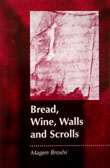
This volume of essays by Magen Broshi, formerly Curator of the Shrine of the Book at the Israel Archaeological Museum in Jerusalem and a veteran archaeologist, covers various aspects of both the material and spiritual life of ancient Palestine in the biblical and post-biblical periods. Among the topics addressed in this entertaining and illuminating book are wine and food consumption, studies of population, the ancient city of Jerusalem, the Dead Sea Scrolls and the use and abuse of archaeology in historical and biblical research. This volume is designed for scholars and for any non-specialists with a keen interest in ancient life in the Holy Land.
Before his retirement, Magen Broshi was Curator, Shrine of the Book, Israel Museum, Jerusalem.
Reviews
4 ratings
Young Gun Park
6/29/2024
Karl Lawrence Rupp
2/1/2017

Dave Crosby
12/2/2014
A must have for anyone interested in deepening their understanding of Scripture.J.R. Woods
9/3/2013